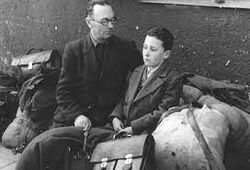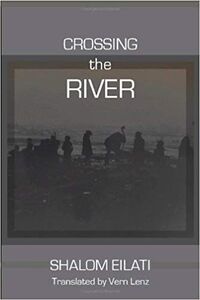Shalom Eilati (M / Lithuania, 1933), Holocaust survivor

Shalom Kaplan / Shalom Eilati (M / Lithuania, 1933), Holocaust survivor
- KEYWORDS : <Kovno Ghetto> <Hidden Children> -- <Russia> <Israel>
- MEMOIRS : Crossing the River (1999)
Biography
Shalom Kaplan Eilati was born in 1933 in Kovno, Lithuania. He was the son of Israel Kaplan, one of the first Holocaust scholars. He immigrated to Palestine in 1946.
Book : Crossing the River (1999)
- לחצות את הנהר <Hebrew> (Jerusalem: Yad Vashem, 1999). English ed. Crossing the River (Tuscaloosa : University of Alabama Press, 2008).
"Crossing the River is a personal memoir-and more. Against the backdrop of Lithuania's occupation-first by the Red Army, next by the Germans, and then again by the Russians-it is a story reflected through the prism of a sharp-eyed young child, Shalom Eilati. His story starts in the occupied Kovno Ghetto and ends with his flight across the Soviet border, through Poland and Germany and finally, his arrival in Palestine. The adult survivor, while recalling the terrorized child that he was and how he then perceived the adult world, also takes stock of his present life. Throughout the memoir, Eilati attempts to reconcile his present life as a husband, father, scientist, and writer, with the images, feelings, and thoughts from the past that have left an indelible mark on his life and that continue to haunt him."--Publisher description.
Contents : How it began -- Summer -- Autumn -- Winter -- The quiet season/childhood in the ghetto -- Another Fall and Winter -- Spring -- Escape -- On green hill -- In the village -- Liberation -- A new year -- Second year/seven journeys.
USHMM Oral Interview
Shalom Eilati, born in 1933 in Kaunas, Lithuania, discusses being the eldest of two children; attending a Hebrew school; holiday visits to his grandfather, a rabbi in Viduklė; Soviet occupation; transfer to a Yiddish school; German invasion in June 1941; staying in a bunker for three days; anti-Jewish restrictions; ghettoization in August; his father's appointment to the Aeltestenrat, which saved many Jews, as ghetto historian; attending school; a large round-up in fall 1941 from which they were freed; the next morning hearing and seeing mass shootings in the distance at the Ninth Fort and corpses at the round-up area; his father's deportation to Riga, Latvia in February 1942; receiving letters from him through Lithuanian and Latvian friends; his mother smuggling food into the ghetto from her workplace; joining a Zionist group guarding community gardens; public hanging of a friend for smuggling; singing in a choir; his mother's involvement in the ghetto underground, through which he met its leader, Chaim Yellin; his mother taking his sister to hide with Lithuanians; attending an ORT school; hiding during the round-up of children; his mother arranging for him to be smuggled out of the ghetto and hidden with a Lithuanian family in April 1944; being moved to a farm in Liepynai in June; the farmer sending him to hide in the forest; liberation by Soviet troops; traveling to Marijampolė; returning to Kaunas with help from a Soviet officer; living with a Jewish couple for a year; finding personal belongings in the ashes of the ghetto; living in an orphanage for six months; hearing from his father; leaving to join him with a Beriḥah group; capture by Soviets in Vilnius; interrogation by the NKVD; escaping; the Jewish community hiding him, then arranging his travel to join his father in Munich, Germany in March 1946; immigration to Palestine two weeks later; joining his aunt; celebrating his bar mitzvah three weeks after his arrival; nightmares resulting from his experiences; his father's reluctance to share his experiences; difficulty confirming his mother's and sister's deaths; and writing his memoir over the last twenty-three years. (He shows photographs and sings ghetto songs.)
